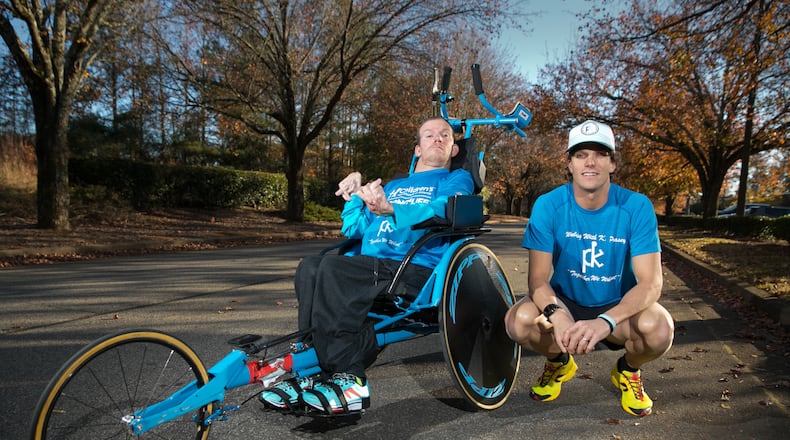The push-assist division at the AJC Peachtree Road Race is the only competitive push-assist division in the country. For Ricardo Aranda, that makes the race the equivalent of the Kentucky Derby.
Aranda began racing in 2015 after attending a camp put on by the Kyle Pease Foundation for young adults and adults with special needs. He was “recruited in” to racing and hasn’t looked back.
Aranda participated in his first Peachtree Road Race in 2016 as one of three male athletes in the push-assist division, in which in-chair athletes are pushed by volunteer runners. The 2020 edition of the race will be his fifth.
“The Peachtree for me is like the Kentucky Derby,” Aranda said. “… When ‘God Bless America’ gets sung at the Peachtree for the start of the wheelchair division, for me, it’s the equivalent of hearing ‘My Old Kentucky Home.’”
Though things won’t quite be the same this year, with the race being conducted in a virtual format, Aranda isn’t fazed. He knows that when it comes time to race, it still will be an intense competition.
“It’s not gonna feel that different at all,” Aranda said. “Derby Day is Derby Day regardless for me. … Since the race is virtual, my plans are just to do what I would normally do in person, which is give it my best and hope for a safe trip and go as hard as I can.”
In a normal year, the push-assist division is capped at nine teams, all of whom have to qualify based on a strict set of time standards. This year, because the race is being run virtually because of the coronavirus pandemic, the Kyle Pease Foundation was able to open the entrant pool to anyone who wanted to participate — no qualification required.
They registered 26 in-chair athletes, and 22 of them will participate in a socially distant in-person event organized by the foundation on the Silver Comet Trail on Saturday.
“It’s more inclusion,” said Shawna Gray, a spokeswoman for the foundation. “It’s truly more inclusion. It’s more individuals in wheelchairs and in racing chairs wearing that Peachtree shirt. (Atlanta Track Club) always talks about that coveted Peachtree shirt. We have more inclusion of athletes wearing that Peachtree shirt.”
Inclusion has been a focus for the Kyle Pease Foundation since its inception. After finishing his first triathlon with his older brother Brent in 2011, Kyle knew he wanted everyone who uses a wheelchair to be able to experience the same feeling. Today, the foundation has helped more than 400 wheelchair athletes cross finish lines, and the foundation provides all equipment required for its athletes to compete.
For athletes such as Kevin Enners, the increased opportunities provided by the virtual race mean everything. Enners uses a modified recumbent tricycle, which allows him to race independently but historically hasn’t been approved for the Peachtree Road Race. Enners’ father, Rich, estimates they’ve been trying to get accepted for ten years.
“We met Kyle and Brent over ten years ago, just as they started the foundation,” Rich Enners said. “They had just finalized the documentation to form the foundation. I think ever since then, we were trying to get into Peachtree. We met with Rich (Kenah, the executive director of the Atlanta Track Club) and we had a conversation with him. He’s like, ‘I can guarantee you that we’ll keep considering it. I can’t guarantee you that it’ll ever happen.’”
Though the Ennerses are careful, they understand why race organizers are reluctant to allow bikes or similar equipment in their races. But for Kevin Enners, his trike gives him independence, and being able to participate in this year’s Peachtree Road Race is the culmination of years of work.
“My Catrike — the cycle I ride now — is a compilation of trials and failures and successes with various bikes,” Enners said. “Each time I hop on it, I have a renewal of independence, whether in a race, in a workout on the indoor rollers or just tootling around. It gives me independence and, to a person with a disability, that’s everything.
“… The Kyle Pease Foundation has fought for years to open a division in which I and other KPF athletes can participate and so, my first Peachtree Road Race — even though it is virtual — will be a milestone. Not just for me, but for inclusion in the sport as well.”
About the Author
Keep Reading
The Latest
Featured




